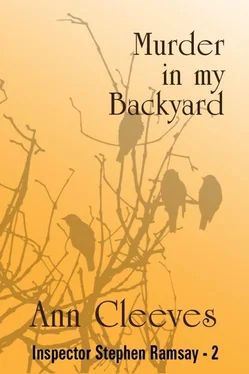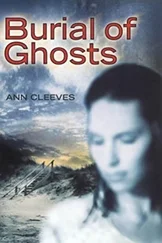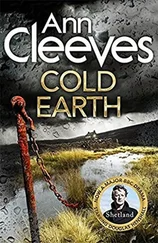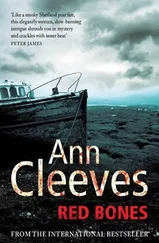Ann Cleeves - Murder in My Backyard
Здесь есть возможность читать онлайн «Ann Cleeves - Murder in My Backyard» весь текст электронной книги совершенно бесплатно (целиком полную версию без сокращений). В некоторых случаях можно слушать аудио, скачать через торрент в формате fb2 и присутствует краткое содержание. Жанр: Детектив, на английском языке. Описание произведения, (предисловие) а так же отзывы посетителей доступны на портале библиотеки ЛибКат.
- Название:Murder in My Backyard
- Автор:
- Жанр:
- Год:неизвестен
- ISBN:нет данных
- Рейтинг книги:5 / 5. Голосов: 1
-
Избранное:Добавить в избранное
- Отзывы:
-
Ваша оценка:
- 100
- 1
- 2
- 3
- 4
- 5
Murder in My Backyard: краткое содержание, описание и аннотация
Предлагаем к чтению аннотацию, описание, краткое содержание или предисловие (зависит от того, что написал сам автор книги «Murder in My Backyard»). Если вы не нашли необходимую информацию о книге — напишите в комментариях, мы постараемся отыскать её.
Murder in My Backyard — читать онлайн бесплатно полную книгу (весь текст) целиком
Ниже представлен текст книги, разбитый по страницам. Система сохранения места последней прочитанной страницы, позволяет с удобством читать онлайн бесплатно книгу «Murder in My Backyard», без необходимости каждый раз заново искать на чём Вы остановились. Поставьте закладку, и сможете в любой момент перейти на страницу, на которой закончили чтение.
Интервал:
Закладка:
“Go and fetch your father,” she said. “ Tell him I’m making some tea.”
He nodded, pulled on Wellingtons, and went outside.
Robert Grey was in the far end of the tractor shed, in the shadow. He stood quite still, with his back to the boy.
“Dad,” Ian said. “Mum said you’re to come in for tea.”
The farmer turned quickly. He was holding a wide screwdriver that looked like a knife.
“No,” he said. “I’ll not come in. I’ll just finish this, then I’ll be out of her way.”
“Dad,” Ian said. “ What are you going to do? Things can’t go on like this.”
The farmer moved towards him, the screwdriver still in his hand.
“No,” he said slowly. “ Things can’t go on like this.”
He threw the screwdriver onto a grubby workbench and walked out across the yard towards the village.
Since Charlie Elliot’s death the post office had been closed, and one of the major talking points in the pub among the old men was their inability to collect their pensions.
“Of course old Fred has had a bad time,” they grumbled, “ but it’s about time he started thinking about other folk.”
Even the news that a relief postmistress would be sent out from Otterbridge the following week did nothing to console them. It wouldn’t be the same, they said. Nothing in the village would be the same.
Fred Elliot would not talk to anybody except his widowed sister who had come down from Berwick to look after him and to her he spoke only in monosyllables. He could not explain to her his sense of responsibility, but he went over it again and again in his mind. He knew it was all his fault. If he had told the policeman about Charlie leaving the house again on Saturday night, his son might still be alive.
“I only did what I thought best,” he repeated to his sister, who clucked about him not listening, not understanding.
“Of course you did, pet,” she said. “Of course you did.”
Sometimes when his sister was busy, he would escape to the shed in the backyard to count and tidy the piles of waste-paper, which he intended to sell to provide funds for the hospital where his wife had died. That gave him some comfort, but his sister always found him there and dragged him back to the fire as if he were a naughty child.
“It won’t do you any good,” she said, “brooding on your own out there.” She sat him in his favourite armchair and made him tea and pretended not to notice that he was crying.
In the house behind the garage Maggie sometimes found the tension almost unbearable. Work was no relief with the old men gloatingly reconstructing the crimes as they slurped their beer. Often, when the boys came home from school, she ran away with them and the dogs to the beach. There they would chase together into the wind, shouting to each other, laughing, trying to forget the solemn silence in the house, the sound of Olive crying to herself in her bedroom when she thought no-one was listening. The boys made death-defying leaps from the highest dunes to the beach and ran along the water’s edge until the water splashed over their Wellingtons.
Despite the secret sobbing, Maggie was more concerned about her father than her mother. It was natural that her mother should be upset. She and Alice Parry had been friends. But in a week her father seemed to have aged so that she hardly recognised him. He had always been the stern one, the one to insist on discipline when the boys misbehaved at table, to supervise their schoolwork. Now he was hardly aware of their presence. The boys sensed it and stole unusual privileges-late television, sweets before meals, rudeness to their mother-but still they failed to provoke him to any reaction.
On Friday morning, almost a week after Alice Parry’s death, Tom Kerr had arranged to meet the vicar in the church to discuss the music for Easter. Kerr was also sacristan and he felt a major responsibility for preparing the church for the festival, but throughout the conversation his mind wandered and he saw the priest looking at him strangely.
“I’m sorry,” he said. “This terrible business has upset me. I can’t concentrate on anything.”
“No,” the vicar said. “ Of course.”
Let me talk to you, Kerr wanted to say. I need help. But the moment was lost and the vicar looked at his watch and then hurried away to a mothers’ union meeting in the neighbouring parish. Kerr lingered in the church.
Maggie found him there, sitting on one of the pews close to the aisle, not praying but staring at the light coming through the stained-glass window above the altar.
“Dad,” she said. “What’s the matter? Mam’s worried about you. She saw the vicar leave half an hour ago.”
She squeezed past and sat beside him on the polished pew. It was Lent and the church was bare. Maggie wished her father would stand up and walk out into the fresh air. Churches made her uncomfortable.
“I don’t know what to do,” Tom Kerr said. “ I’ve been foolish. I’m in terrible trouble and I don’t know what to do to put it right.”
“Tell me,” she said. “Perhaps I can help.”
“No,” he said sharply. “This is my business. No-one else must get involved. I’ll have to sort it out for myself.”
“It’s my fault, isn’t it?” she cried. “It’s something to do with Charlie. What have you done?”
He turned to face her and the warm light from the stained glass reflected on his spectacles so that she could not see his eyes.
“You’ll have to leave it to me,” he said. “ Now go away. I want to be on my own to think.”
She left him, trying to tell herself that he was a stubborn man with too many principles. His imagined crimes would be trivial compared with the things she could dream up. But she remembered his terrifying and merciless temper and her anxiety grew.
When Ramsay arrived in Brinkbonnie at midday, he went to the garage first. If Henshaw were blackmailing or threatening one of the leaders of the village, Ramsay thought, Tom Kerr would know. He seemed to have assumed responsibility for the place’s moral welfare. The workshop was unlocked and Ramsay went inside, but it was empty, and when he knocked at the door of the house, there was no reply. He walked on past the row of cottages and crossed the road towards the pub. In the Tower field the surveyors were back, sitting close to the hedge to eat their sandwiches so that they could not be easily seen from the street.
In the Castle Hotel Maggie Kerr was behind the bar and the same old men sat staring at their beer and the dominoes board. There Ramsay made himself popular. He bought them all drinks and sat down with them and encouraged them to gossip. There must be scandal in a village like this, he said. There must be secrets, skeletons in cupboards. The old men chuckled and said he was right. “Man, you could write a book about the things that go on in this village.” But their scandals had happened years before. They talked about the American soldiers based in Otterbridge and children born out of wedlock during the war. They talked of family fueds and grievances stored for twenty years. None of it helped Ramsay at all, and he was about to leave when they started talking about Robert and Celia Grey. Again they began their story many years before. It had all started with the old lady, they said, Celia’s mother. She was the cause of all their problems, sitting in the corner of the kitchen like a poisonous old spider, giving out her orders. No wonder Celia went a bit wild when the old cow died.
“Wild?” Ramsay said. “ I wouldn’t call Celia Grey wild.”
“No,” they said. “Well, strong-willed then. She knows what she wants and nothing will stop her getting it.”
“Tell me about it,” Ramsay said, buying more drinks, hoping for details.
Читать дальшеИнтервал:
Закладка:
Похожие книги на «Murder in My Backyard»
Представляем Вашему вниманию похожие книги на «Murder in My Backyard» списком для выбора. Мы отобрали схожую по названию и смыслу литературу в надежде предоставить читателям больше вариантов отыскать новые, интересные, ещё непрочитанные произведения.
Обсуждение, отзывы о книге «Murder in My Backyard» и просто собственные мнения читателей. Оставьте ваши комментарии, напишите, что Вы думаете о произведении, его смысле или главных героях. Укажите что конкретно понравилось, а что нет, и почему Вы так считаете.












